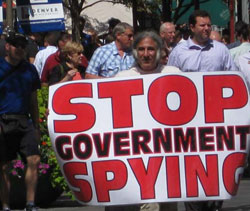Oppose Government Impunity
• U.S. Spy Agencies Are Criminal and Need to Be Shut Down
• Reports of NSA Spying on IMF, World Bank, Congresspeople and Military• NSA Infiltrates Links to Yahoo, Google Data Centers Worldwide
U.S. Spy Agencies Are Criminal
and Need to Be Shut Down
 One report after the other concerning the NSA scandal shows that the NSA, like all U.S. spy agencies, is a criminal agency that needs to be shut down. It has broadly contributed to anxiety and fear across the country, while claiming it is acting to provide for the “security” of Americans. The impunity of the U.S. government to act against basic principles, like upholding sovereignty and international and U.S. laws, is as pervasive as the spying. And the U.S. is now taking things further, refusing to stop the crimes, while saying it is “considering” “curtailing” some of its activities “now.” All that it has already done, and continues to do, and will do is of course not to be spoken to, as it is “classified.”
One report after the other concerning the NSA scandal shows that the NSA, like all U.S. spy agencies, is a criminal agency that needs to be shut down. It has broadly contributed to anxiety and fear across the country, while claiming it is acting to provide for the “security” of Americans. The impunity of the U.S. government to act against basic principles, like upholding sovereignty and international and U.S. laws, is as pervasive as the spying. And the U.S. is now taking things further, refusing to stop the crimes, while saying it is “considering” “curtailing” some of its activities “now.” All that it has already done, and continues to do, and will do is of course not to be spoken to, as it is “classified.”
The U.S. is also refusing to be in any way accountable. The most that is said are recent comments by Secretary of State John Kerry: “I assure you, innocent people are not being abused in this process, but there’s an effort to try to gather information.” He added, “And yes, in some cases, it has reached too far inappropriately.” So all the spying crimes are just “inappropriate” efforts that have “abused” no one and are a legitimate effort to “gather information.” The arrogance and brutality of the U.S. clearly knows no bounds. They are using their spying in an effort to both intimidate and humiliate those involved, while also making clear the U.S. will continue to carry out its crimes. In its effort to hold onto power, it targets both rivals and the growing resistance of the peoples.
Using this excuse of the need for information and secrecy, vital public matters — such as unjust interference in the foreign affairs of other countries and in the personal and political affairs of people inside the country — are kept secret. This was further shown when the Senate Intelligence Committee debate on a bill about the NSA was done in secret! Additionally, in court cases being brought to oppose the criminal spying, the government is also claiming information relevant to the cases must be kept secret. This same stand was taken in relation to providing information concerning those imprisoned indefinitely at Guantánamo and U.S. rendition to torture of people convicted of no crime.
All the U.S. spy agencies, like the NSA, CIA, FBI, the Pentagon’s Defense Intelligence Agency, all have been shown to repeatedly commit crimes at home and abroad. These include assassinations, organizing coups d’etats, infiltrating and disrupting defense organizations of the people, as well as the massive spying and metadata collection of hundreds of millions of people.
These agencies do not contribute to security, any more than U.S. wars and drones do. They get massive amounts of public funding — the amount is kept secret — while undermining security here and worldwide. They need to be shut down and the entire concept of providing for security given a modern definition, one that puts the rights of all at home and abroad at the center.
The current scandal, with massive spying against Germany and France, and reports of NSA targeting of Congresspeople and military forces, also shows that conflicts within the ruling circles and with rivals abroad are intensifying. At home, with the dysfunction of Congress and concentration of power in the executive, the former means to sort out these conflicts short of violent civil war are finished. Now the conflict is focused in the executive branch, of which the spy agencies are all a part. Contention among the rival factions is playing itself out, as the various forces both collude and contend for positions of power. This includes contention between military and civilian forces, within the branches of the military, between the various agencies, as well as between various forces and the president. It is a chaotic and unpredictable situation, which holds within it grave dangers, including potential for violent civil war among the factions.
It is also the case that the U.S. is battling for world empire and that Europe is as much a rival as it is an ally. Control of Europe is necessary for control of Asia. Germany and France want such control as much as the U.S. With the NSA actions, like Obama’s drone warfare, the U.S. is making clear it will do as it pleases to who it pleases, imposing the impunity of Might Makes Right. The spying, at home and abroad is also a means to humiliate all involved. Such mass humiliation is a mechanism of control — but it can also backfire as those impacted, including heads of state, take revenge and the U.S. does the same.
People here and abroad are giving expression to their widespread anger, denouncing the NSA and drones. There is growing recognition that the spy agencies cannot be reformed as it is their very character to commit crimes with impunity. Shut them down now! Stop the Drones and Bring All U.S. Troops Home Now. This would contribute to the security of all.
[TOP]
Obama Said to “Curtail” Certain Activities
Reports of NSA Spying on IMF, World Bank, Congresspeople and Military
 The reports of the all-pervasive scale and scope of spying and metadata collection by the National Security Agency (NSA) continue daily. Most recently it is reported that the NSA has long been spying on the World Bank and International Monetary Fund (IMF), both based in Washington, DC and the United Nations, in New York. These latest reports are in addition to other acts of trampling on the sovereignty of foreign governments, including collecting information on the phone conversations, texts and emails of at least 35 heads of state.
The reports of the all-pervasive scale and scope of spying and metadata collection by the National Security Agency (NSA) continue daily. Most recently it is reported that the NSA has long been spying on the World Bank and International Monetary Fund (IMF), both based in Washington, DC and the United Nations, in New York. These latest reports are in addition to other acts of trampling on the sovereignty of foreign governments, including collecting information on the phone conversations, texts and emails of at least 35 heads of state.
According to reports, Obama is considering ending or curtailing specific activities, like listening in to private conversations, tapping phones, etc. at the headquarters of the IMF and World Bank.
In response to Reuters’ inquiries, a senior Obama administration official said, “The United States is not conducting electronic surveillance targeting the headquarters of the World Bank or IMF in Washington.” Another Obama administration official, who spoke on condition of anonymity, did not address whether the NSA had eavesdropped on the two entities in the past, whether metadata collection continues, as NSA does not consider "gathering" information to be "surveillance, or what future programs may be utilized.
Senator Rand Paul Asks if Obama is Being Spied On
Senator Rand Paul (R-Kentucky) suggested October 30 that the NSA might have records on President Obama’s phone calls. In an interview with Bloomberg, Paul noted that the NSA has acknowledged that it collects data, such as phone numbers, call times and call durations, on all U.S. phone calls. “My question is, are they tapping the president’s phone, also?” Paul said that the court orders authorizing the NSA surveillance are “so expansive and without limit and nonspecific that they apply to all cell phones.” He added, “So conceivably, the NSA could be spying on the president’s phone.” He continued, “Now, I think Obama’s is encrypted. He’s protecting himself from his own spy agency because he’s got his phone encrypted." Paul is a co-sponsor of a bill with Senators Ron Wyden (D-Oregon), Mark Udall (D-Colorado) and Richard Blumenthal (D-Connecticut) that would end the NSA’s bulk phone record collection program.
In a separate interview on Fox News the same day, Paul demanded that Obama respond to allegations that the NSA spied on the Vatican as cardinals met to select a new pope earlier this year. As with previous reports, the NSA has categorically denied targeting the Vatican, which was first reported in an Italian magazine. “The NSA also says collecting bulk data on Americans is not spying,” Paul said. “So you have to parse their words.”
As has been the case in many other instances, NSA uses the term “not targeting” to deny activities that are taking place on a broader scale, just not, in this case, against the Pope. In NSA-speak, they could be “collecting intelligence” on say a cardinal or other individuals at the Vatican, which is not the same as “targeting the Vatican.” Experience has also been that the NSA starts with denials and then admits activity. This is in part to impose the humiliation of the spying on those involved, while also letting it be known that the U.S. has, is and will act with impunity.
Paul’s comments come as other reports indicate that the NSA has long been spying on Congresspeople and military officers, such as General Petraeus, forced to resign over an affair that was “leaked.” Snowden is also not the first NSA whistleblower. Various others, such as Russel Tice and William Binney, confirm the widespread nature of NSA spying.
In addition to the metadata and spying on government officials, foreign and domestic, the NSA has also long and extensively targeted anti-war organizations, civil rights groups, organizers of mass demonstrations, like those against the G20 and NATO and at Republican and Democratic Conventions. Indeed, it is very likely that the spying against dissent is even more widespread and pervasive than that against various government officials — and there are no plans to “curtail” or halt it. In fact,a main aim of the spying is to block and divert dissent, using all variety of means.
[TOP]
NSA Infiltrates Links to Yahoo, Google Data Centers Worldwide
 The National Security Agency has secretly broken into the main communications links that connect Yahoo and Google data centers around the world, according to documents obtained from former NSA contractor Edward Snowden and interviews with knowledgeable officials.
The National Security Agency has secretly broken into the main communications links that connect Yahoo and Google data centers around the world, according to documents obtained from former NSA contractor Edward Snowden and interviews with knowledgeable officials.
By tapping those links, the agency has positioned itself to collect at will from hundreds of millions of user accounts, many of them belonging to Americans. The NSA does not keep everything it collects, but it keeps a lot.
According to a top-secret accounting dated January 9, 2013, the NSA’s acquisitions directorate sends millions of records every day from internal Yahoo and Google networks to data warehouses at the agency’s headquarters at Fort Meade, Maryland. In the preceding 30 days, the report said, field collectors had processed and sent back 181,280,466 new records — including “metadata,” which would indicate who sent or received e-mails and when, as well as content such as text, audio and video.
The NSA’s principal tool to exploit the data links is a project called MUSCULAR, operated jointly with the agency’s British counterpart, the Government Communications Headquarters (GCHQ). From undisclosed interception points, the NSA and the GCHQ are copying entire data flows across fiber-optic cables that carry information among the data centers of the Silicon Valley giants.
The infiltration is especially striking because the NSA, under a separate program known as PRISM, has front-door access to Google and Yahoo user accounts through a court-approved process.
The MUSCULAR project appears to be an unusually aggressive use of NSA tradecraft against flagship American companies. […]
In a statement, the NSA said it is “focused on discovering and developing intelligence about valid foreign intelligence targets only.”
In a statement, Google’s chief legal officer, David Drummond, said “We are outraged at the lengths to which the government seems to have gone to intercept data from our private fiber networks, and it underscores the need for urgent reform.”
A Yahoo spokeswoman said, “We have strict controls in place to protect the security of our data centers, and we have not given access to our data centers to the NSA or to any other government agency.”
Under PRISM, the NSA gathers huge volumes of online communications records by legally compelling U.S. technology companies, including Yahoo and Google, to turn over any data that match court-approved search terms. That program, which was first disclosed by The Washington Post and the Guardian newspaper in Britain, is authorized under Section 702 of the FISA Amendments Act and overseen by the Foreign Intelligence Surveillance Court (FISC). […]
Outside U.S. territory, statutory restrictions on surveillance seldom apply and the FISC has no jurisdiction. Senate Intelligence Committee Chairman Dianne Feinstein (D-California) has acknowledged that Congress conducts little oversight of intelligence gathering under the presidential authority of Executive Order 1233, which defines the basic powers and responsibilities of the intelligence agencies. […]
 The operation to infiltrate data links exploits a fundamental weakness in systems architecture. To guard against data loss and system slowdowns, Google and Yahoo maintain fortresslike data centers across four continents and connect them with thousands of miles of fiber-optic cable. Data move seamlessly around these globe-spanning “cloud” networks, which represent billions of dollars of investment.
The operation to infiltrate data links exploits a fundamental weakness in systems architecture. To guard against data loss and system slowdowns, Google and Yahoo maintain fortresslike data centers across four continents and connect them with thousands of miles of fiber-optic cable. Data move seamlessly around these globe-spanning “cloud” networks, which represent billions of dollars of investment.
For the data centers to operate effectively, they synchronize large volumes of information about account holders. Yahoo’s internal network, for example, sometimes transmits entire e-mail archives — years of messages and attachments — from one data center to another.
Tapping the Google and Yahoo clouds allows the NSA to intercept communications in real time and to take “a retrospective look at target activity,” according to one internal NSA document. […]
Because digital communications and cloud storage do not usually adhere to national boundaries, MUSCULAR and a previously disclosed NSA operation to collect Internet address books have amassed content and metadata on a previously unknown scale from U.S. citizens and residents. Those operations have gone undebated in public or in Congress because their existence was classified. […]
It is not clear how much data from Americans is collected and how much of that is retained. One weekly report on MUSCULAR says the British operators of the site allow the NSA to contribute 100,000 “selectors,” or search terms. That is more than twice the number in use in the PRISM program, but even 100,000 cannot easily account for the millions of records that are said to be sent to Fort Meade each day.
In 2011, when the FISC learned that the NSA was using similar methods to collect and analyze data streams — on a much smaller scale — from cables on U.S. territory, Judge John D. Bates ruled that the program was illegal under FISA and inconsistent with the requirements of the Fourth Amendment.
[TOP]
Feinstein Bill Legalizes and Expands Surveillance
 Legislation that would restore legitimacy to the National Security Agency by giving off the appearance of improving privacy protections and enhancing transparency of U.S. surveillance passed in the Senate intelligence committee. The bill was drafted and shepherded through the committee by Democratic Senator Dianne Feinstein, one of the most passionate defenders of U.S. government surveillance.
Legislation that would restore legitimacy to the National Security Agency by giving off the appearance of improving privacy protections and enhancing transparency of U.S. surveillance passed in the Senate intelligence committee. The bill was drafted and shepherded through the committee by Democratic Senator Dianne Feinstein, one of the most passionate defenders of U.S. government surveillance.
The American Civil Liberties Union argues Feinstein’s legislation would legalize “warrantless wiretapping of people known to be located in the U.S. for seven days, if surveillance began abroad.” It would legalize “queries of U.S. persons’ names or email addresses” without probable cause, so long as there was an “articulable foreign intelligence purpose.”
Under a section of the PATRIOT Act, Section 215, which is supposed to govern bulk data collection, the bill changes how the NSA is allowed to access the data but it does not limit the amount of records that are being collected by the NSA on a regular basis.
Yet, those targeted in searches, according to Marcy Wheeler, would not have to be tied to al Qaeda or even Iran [as was previously the case — VOR Ed. note]. If they were “associated with activities in preparation” for “international terrorism,” they could be “queried.”
Wheeler asked, “Does that include taking pictures of landmark buildings? Does that include accessing a computer in a funny way?”
Julian Sanchez of the CATO Institute thinks the bill might make it easier to collect the content of Americans’ communications.
Thomas Earnest, a lawyer and managing editor of Just Security, wrote that the legislation would “codify the NSA metadata program in its current form” and, more significantly, it would “eliminate argument by critics that the program exceeds the scope of Section 215.”
Feinstein’s bill would allegedly make it possible for “outside groups” to file amicus briefs and challenge Foreign Intelligence Surveillance Court rulings. However, as has been seen over the past months, groups are already filing challenges so this should not be considered much of a change at all.
As Trevor Timm of the Electronic Frontier Foundation suggests, her bill would “permanently entrench the NSA’s collection of every phone record held by US telecoms.”
She likes to say that the dragnet collection of Americans’ phone records is “intelligence collection,” and “not a surveillance program.” The bill that Feinstein has proposed is not a reform legislation. […]
Feinstein’s legislation to bring transparency was marked up and senators voted on the bill in total secrecy. She did not want the American people to be able to hear senators debate her legislation and invoked “national security” to keep the markup closed.
Both Senator Ron Wyden and Senator Mark Udall, who serve on the intelligence committee, voted against the legislation. They have both been advocates for reining in surveillance and ending some surveillance programs entirely.
Wyden declared, “The Senate Intelligence Committee approved a bill that would codify overbroad surveillance practices that infringe on the constitutional rights of law-abiding Americans without making America any safer. I voted against this legislation in committee, and I will strenuously oppose any similar attempts to codify overreaching government surveillance.”
He said Feinstein’s bill maintains “business as usual instead of ending the bulk collection of Americans’ personal records, closing the back-door searches loophole that allows intelligence agencies to search for Americans’ communications without a warrant, ending the government’s reliance on secret surveillance law, and ensuring that courts can adequately review these authorities and the actions taken under them.” […]
Wyden warned of Feinstein’s imminent effort to protect “business as usual” at a CATO Institute event in October. He told an audience the “government’s intelligence leadership, their allies in think tanks and academia, retired government officials and sympathetic legislators” would “try mightily to fog up the surveillance debate and convince the Congress and the public that the real problem here is not overly intrusive, constitutionally flawed domestic surveillance but sensationalistic media reporting. […]
But just as one might expect, the passage of Feinstein’s bill was reported as one of a number of legislative proposals that have been introduced to “reform” government surveillance. Editors gave her the benefit of the doubt, even though the content of her bill plainly demonstrates it would do no such thing. […]
[TOP]
